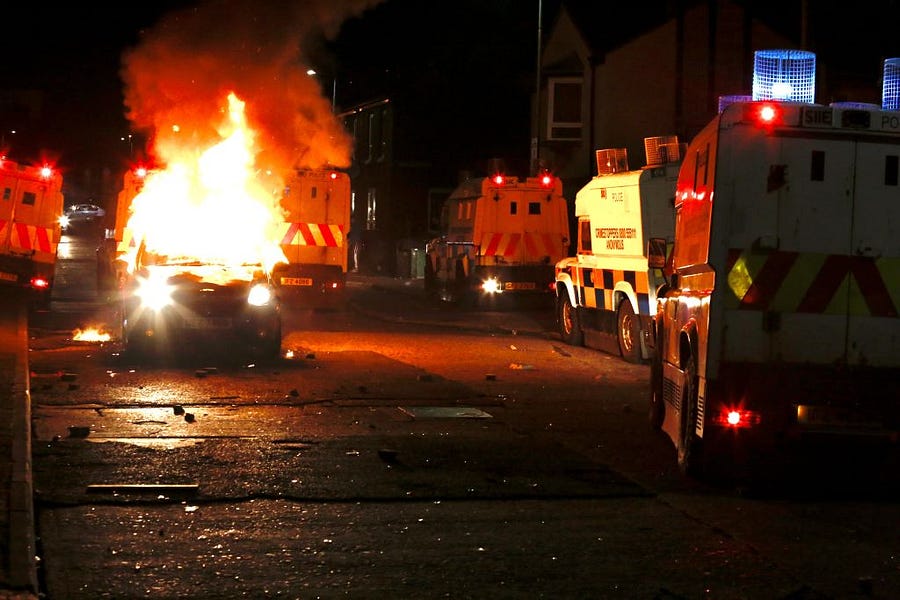Northern Ireland has been engulfed in riots for almost two weeks. Thus far there have been no casualties, but 88 police officers have been injured and property damage has been severe. Because the riots have been carried out by unionists—those who want Northern Ireland to remain as part of the United Kingdom—many are speculating that this could herald a return to the Troubles that plagued Northern Ireland for 30 years. Pundits have blamed the riots on a trade agreement signed by Boris Johnson’s government with the EU late last year in the wake of the completion of Brexit. But the violence can likely be attributed to other causes.
In an article last year, I outlined why Northern Ireland posed such a problem to the negotiations between the U.K. and the EU: Brexit ended the free movement of people and goods between the U.K. and the rest of the EU. But that created its own problem: The Republic of Ireland is an EU member, and because of the Good Friday Agreement signed in 1998 to end the Troubles, there cannot be a hard border between the independent Republic of Ireland and Northern Ireland.
With Brexit, this became a nearly unsolvable equation: How could the U.K. end freedom of movement with Europe but keep it with Ireland? If it were maintained, anyone who wanted to move to the U.K. could simply pass through the Republic of Ireland to the north, where they could then take a domestic flight to the rest of Britain. Likewise, goods could easily be smuggled into and out of the U.K. without paying tariffs. The other option—to set up a formal physical border—would be seen as a betrayal by the Republicans, led by Sinn Fein, and many feared it would reignite the Troubles.
In the end, the U.K. effectively chose to move the border: Instead of border controls between the Republic and Northern Ireland, border checks would take place between Northern Ireland and the rest of the U.K. Northern Ireland would in practice remain part of the single market, and would continue to have to obey EU directives and regulation, although without having any influence over them. Unionists, who in 2016 voted to leave the EU by a crushing majority, were enraged by this betrayal, even more so because the main unionist party in Northern Ireland—the Democratic Unionist Party—had propped up the Conservative government after it lost its majority in the 2017 election. To the loyalists, it seemed as if the Conservatives had repaid them by turning their region into a colony of Brussels.
While the trade agreement provided fertile ground for unionist disappointment, it is probably not what started the riots.
For starters, unionist disappointment with the U.K. has run deep for decades. Even during the Troubles, unionists were worried that the government would pull out and leave them in the hands of the Republic, which is part of the reason they formed their own paramilitaries to fight the IRA rather than just rely on the British army to defend them. They may have been right to be concerned, as even Margaret Thatcher—widely considered a foreign policy hawk—actually admitted she had considered ceding at least part of Northern Ireland to the south.
She was not the first. In the early 1920s, Winston Churchill played a key role as a diplomat, negotiating with the original IRA who for two years had waged a relentless guerilla war campaign to obtain Irish independence. These negotiations ended with the creation of Northern Ireland. Yet, despite being arguably the architect of Northern Ireland, Churchill offered Northern Ireland to the Republic if it would agree to join the Allied side during World War II (Ireland declined, believing the U.K. would lose the war). Later, during the 1950s, he expressed his wish that Ireland would one day be reunited.
In 1993, Conservative Prime Minister John Major signed a declaration stating the U.K. had no “selfish strategic or economic” interest in Northern Ireland. The message many unionists took away was that the U.K. considered Northern Ireland effectively worthless. The Troubles had distracted every British government since the late 1960s, and Northern Ireland was becoming a serious drain on the economy, relying on large subsidies from the British government to stay afloat. Polls have consistently shown that the British public do not particularly care whether Northern Ireland stays or goes: In a poll from 2019, 54 percent of respondents stated that they would either want the North to join the Republic or that they didn’t mind either way. Another poll from March 2020 found a plurality of voters in every party supporting Northern Ireland holding a referendum on whether to rejoin Ireland, and only 24 percent stated they would be upset if the Northern Irish voters were to choose to do so. Furthermore, 62 percent of English voters stated in a different poll that they did not want English tax money to be spent in Northern Ireland, as is currently the case.
It is also important to note that the riots are happening now, not back in January when the trade agreement went into force. This points to the riots being triggered by something other than the trade agreement. In fact, there is such a trigger: In June last year, the former IRA head of intelligence Bobby Storey passed away. About two dozen Sinn Fein politicians, along with thousands of Republican sympathizers, breached the lockdown restrictions to attend the funeral and pay their respect to the former leader of an organization that murdered thousands of British civilians. An investigation ensued, but late last month, the Police Service of Northern Ireland (PSNI) announced that there would be no prosecution, despite overwhelming evidence of the rule-breaking.
Unionists have always been suspicious of Sinn Fein’s commitment to the peace process, which is somewhat justified as Sinn Fein has never apologized for supporting the IRA’s armed struggle. The high attendance of Sinn Fein politicians at the funeral was not surprisingly provoking. What really caused the situation to explode into violence, however, was the decision by the Police Service of Northern Ireland not to prosecute the Sinn Fein politicians despite them clearly breaching the lockdown. There is little doubt that the decision was a political one, meant to keep the peace and not upset the Republicans.
To the unionists, this is nothing but an abject surrender by the police authorities to the IRA, an organization that killed hundreds of policemen during the Troubles. For those who feel they’ve been abandoned by the British government and its people, a betrayal by their own police is the very last straw. It should be noted that the Democratic Unionist Party, despite being highly critical of the police decision, has strongly condemned the riots.
The question now remains what should be done. First, Northern Ireland authorities should prosecute the politicians who attended the funeral. It makes no sense to allow politicians of any party to be above the law, especially given how harshly the lockdown has otherwise been enforced. Further, Boris Johnson should make an iron-clad promise that there will be no referendum on the status of Northern Ireland during the current term in Parliament, which ends in 2024. There are good reasons to postpone such a poll for a few years, until the fallout of Brexit has become clear. Right now, it is too early to say how things will turn out, the British public is still very divided and to some extent defined by differing opinions of Brexit, and there is a clear risk that a border poll would become a proxy for a Brexit referendum, with opponents of Brexit voting to join the Republic of Ireland, and supporters voting to remain in the U.K.
The government should promise to campaign in favor of Northern Ireland remaining in the U.K. in a future referendum campaign. Further, every major party, but in particular the Conservatives, should pledge to spend at least as much money on a referendum campaign to keep Northern Ireland in the U.K. as they did during the Scottish independence referendum in 2014.
Finally, the British government should agree to fully reimburse Northern Ireland for any economic loss that stems from the new obstacles in trade with the rest of the U.K. This would mean an increase in the block grant which Northern Ireland annually receives from the U.K.
The Irish government, meanwhile, should introduce a constitutional amendment protecting the rights of unionists and the unique Ulster identity and culture in a hypothetical future United Ireland. This could also involve a greater degree of local government for Northern Ireland (or the counties of Northern Ireland where unionists are a majority), possibly even keeping Stormont, Northern Ireland’s regional parliament, in some form. Polls over the past few years have shown an increasing level of support for reunification in Northern Ireland, and it is well past time that the Irish government take steps to ensure that a transfer of territory can happen peacefully.
As for the United States, President Joe Biden, while stopping short of outright endorsing reunification, has repeatedly made it clear that his sympathy lies with Ireland. This is not surprising given his heritage, but right now, it is absolutely vital that the U.S. stays clear. President Biden has condemned the riots, but this should be the extent of U.S. involvement for now.
While the debate over Northern Ireland’s status is unlikely to be resolved any time soon, it’s possible for the region to return to peace, and for the ballot box not once again to be replaced by the ArmaLite.
John Gustavsson is a conservative writer from Sweden and has a Ph.D. in economics.






Please note that we at The Dispatch hold ourselves, our work, and our commenters to a higher standard than other places on the internet. We welcome comments that foster genuine debate or discussion—including comments critical of us or our work—but responses that include ad hominem attacks on fellow Dispatch members or are intended to stoke fear and anger may be moderated.
With your membership, you only have the ability to comment on The Morning Dispatch articles. Consider upgrading to join the conversation everywhere.